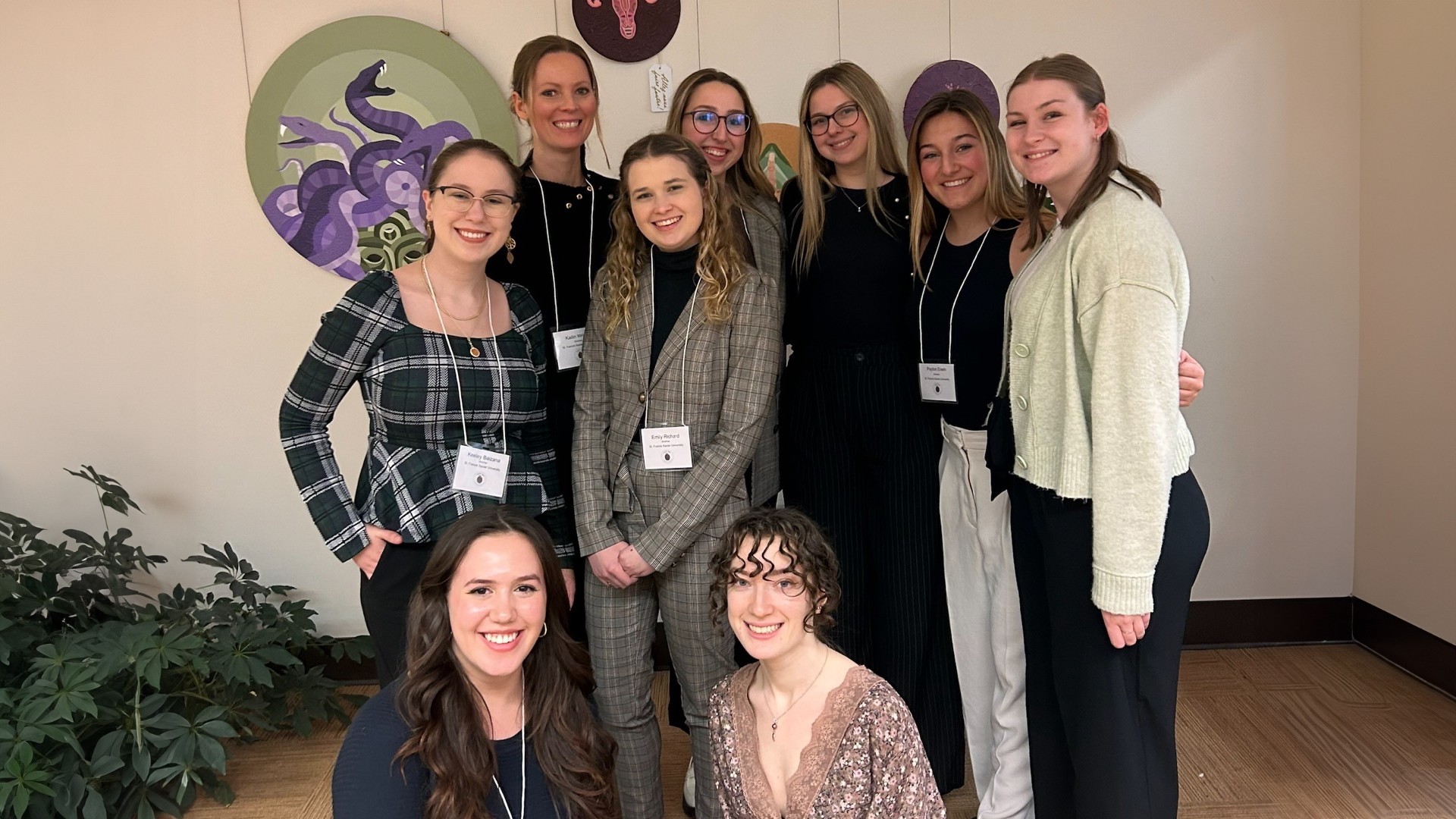
An unprecedented number of seven StFX English students presented research papers and original poetry at the Annual Atlantic Undergraduate English Conference (AAUEC) held March 23-24th at the Université de Moncton, while an eighth student joined the delegation as a professional development opportunity.
“StFX's English Department requested an extra spot to accommodate for the strong paper submissions and students' interest this year,” says English professor Dr. Kailin Wright, who accompanied the students to the conference, and says each Atlantic university can choose up to four paper presenters and two creative writers to attend the conference each year. While many universities don’t fill this quota, StFX made a request to add one more.
Dr. Wright says the StFX English students gained vital experience at a scholarly conference that will give them a real advantage when in graduate school or their professional careers. “Most students do not get this type of opportunity until they are in a PhD. They are also making connections with other outstanding StFX students that will stay with them for years to come,” she says. “On a personal note, I feel so lucky that I get to work with these bright and hardworking students."
For the students, the opportunity was invaluable.
“I was honoured to attend the AAUEC and share my work, titled, “Somehow it’s Been Overlooked”: Female Characters as Unlikely Heroes in The Handmaid’s Tale and Fifth Business,” says third year English student Sadie MacDonald.
“This essay is extremely important to me, and I am grateful that I got to share my research, of how female characters in literature are often undermined and undervalued heroes, to students from across Atlantic Canada and faculty mentors. An opportunity that enables my voice and many other undergraduate students to be heard is something so special as it allows theories to be challenged and new ideas to flourish. The AAUEC was a learning opportunity by getting me out of my comfort zone and engaging in public speaking as well as a panel discussion. Through sharing my work with others, I received generous feedback and engaged in impactful conversations that will stick with me forever,” she says.
In total, five StFX English honours and major students, Ms. MacDonald, Sara Waldron, Payton Erwin, Grace Still, and Emily Richard, presented their research papers on topics ranging from a reclamation of Shakespeare's Iago to romance and realism in Anne of Green Gables. On top of these dynamic paper presentations, two StFX creative writers, Keeley Baizana, a fourth year English major, and senior student Rachel Manning presented original poetry and received detailed questions about their work process.
“The excellent papers were well-received with a packed audience clamouring to ask all their questions of the presenters,” says Dr. Wright, who also held one-on-one abstract-writing mentor sessions and organized a conference presentation workshop for the students.
English Student Society co-president, Ciara Wainwright, a third year honours student, also attended as a professional development experience and supported her fellow English students.
StFX students presenting at the conference included:
Sara Waldron, a fourth year English honours student presented a feminist and motherhood studies analysis of Baba Yaga as the original radical witch; the paper was taken from the first chapter of her thesis "The Original Wicked Witch: Empowering Wickedness, Motherhood, and Domesticity in Baba Yaga and Modern Witches.”
Sadie MacDonald, a third year English major, shared a paper that critiqued Northrop Frye's theory of romance heroes to argue that our literary genres need to be more inclusive of female heroes in works like The Handmaid's Tale and Fifth Business.
Payton Erwin, a third year English honours student, argued that Disney films—Sleeping Beauty, Cinderella, and Frozen—spatialized female passivity by separating the princess-to-be figure from society and thereby rendering her as helpless and in need of saving; she then went on to examine how Elsa complicates this spatialized gender formula by creating her own castle as a place of empowered isolation.
Grace Still, a third year English honours student, looked at a modern adaptation of Shakespeare's Iago and how it vindicates the iconic vice figure—a convincing paper on how stories can undo the dangerous polarization of good and bad.
Emily Richard, a second year history and English student, argued that the adaptation Anne with An E failed to keep the romance and Romantic genre elements from Montgomery's Anne of Green Gables narrative due to the socio-cultural updating.
The students’ trip was funded by a Jules Léger Student Conference and Colloquia grant and a SSHRC Insight Grant supported Dr. Wright's travel to the conference.

